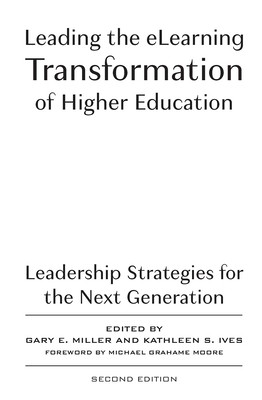
- We will send in 10–14 business days.
- Publisher: Stylus Publishing (VA)
- ISBN-10: 1642671487
- ISBN-13: 9781642671483
- Format: 15.8 x 22.6 x 2.8 cm, kieti viršeliai
- Language: English
- SAVE -10% with code: EXTRA
Leading the Elearning Transformation of Higher Education (e-book) (used book) | bookbook.eu
Reviews
Description
Published in Association witheLearning has entered the mainstream of higher education as an agent of strategic change. This transformation requires eLearning leaders to develop the skills to innovate successfully at a time of heightened competition and rapid technological change.
In this environment eLearning leaders must act within their institutions as much more than technology managers and assume the prime role of helping their institutions understand the opportunities that eLearning presents for faculty, for students, and for client organizations in the community. They need to prepare to participate in policy development around these opportunities. They must understand the multiple dimensions of practice in the field--operations, administration, and working within the complex culture of a higher education institution--while also functioning as scholars of the field who can bring the best ideas from other institutions to help shape policy around eLearning.
The second edition builds on the success of the first edition and presents both the collective expertise of veterans who have pioneered the field for 20 years, and of a rising generation of eLearning leaders that are transforming online programs at their own institutions, to address these challenges.
This edition has been updated and expanded to reflect the increasing complexity of the field with seven new chapters and the revision of eight chapters that appeared in the first edition. New and updated topics include:
- The evolving role of the chief online learning officer
- Issues of diversity as more women and minorities enter leadership roles in the field
- The increasing role of learning analytics and data-based decisions
- The potential tensions involved in cohort-based versus individualized instruction
- The increasing need for faculty professional development
- The affordances of cloud computing, adaptive learning, artificial intelligence, the internet of things, and mobile learning to the field
- The open educational resources movement and the implications for institutional policy and practice
- The challenges of an increasingly complex competitive environment
- Accessibility
There are few comparable positions in higher education than that of eLearning leaders who work across multiple academic and support units and whose work fundamentally affects the institution as a whole. This volume is written for them.
EXTRA 10 % discount with code: EXTRA
The promotion ends in 22d.18:31:51
The discount code is valid when purchasing from 10 €. Discounts do not stack.
- Publisher: Stylus Publishing (VA)
- ISBN-10: 1642671487
- ISBN-13: 9781642671483
- Format: 15.8 x 22.6 x 2.8 cm, kieti viršeliai
- Language: English English
eLearning has entered the mainstream of higher education as an agent of strategic change. This transformation requires eLearning leaders to develop the skills to innovate successfully at a time of heightened competition and rapid technological change.
In this environment eLearning leaders must act within their institutions as much more than technology managers and assume the prime role of helping their institutions understand the opportunities that eLearning presents for faculty, for students, and for client organizations in the community. They need to prepare to participate in policy development around these opportunities. They must understand the multiple dimensions of practice in the field--operations, administration, and working within the complex culture of a higher education institution--while also functioning as scholars of the field who can bring the best ideas from other institutions to help shape policy around eLearning.
The second edition builds on the success of the first edition and presents both the collective expertise of veterans who have pioneered the field for 20 years, and of a rising generation of eLearning leaders that are transforming online programs at their own institutions, to address these challenges.
This edition has been updated and expanded to reflect the increasing complexity of the field with seven new chapters and the revision of eight chapters that appeared in the first edition. New and updated topics include:
- The evolving role of the chief online learning officer
- Issues of diversity as more women and minorities enter leadership roles in the field
- The increasing role of learning analytics and data-based decisions
- The potential tensions involved in cohort-based versus individualized instruction
- The increasing need for faculty professional development
- The affordances of cloud computing, adaptive learning, artificial intelligence, the internet of things, and mobile learning to the field
- The open educational resources movement and the implications for institutional policy and practice
- The challenges of an increasingly complex competitive environment
- Accessibility
There are few comparable positions in higher education than that of eLearning leaders who work across multiple academic and support units and whose work fundamentally affects the institution as a whole. This volume is written for them.


Reviews